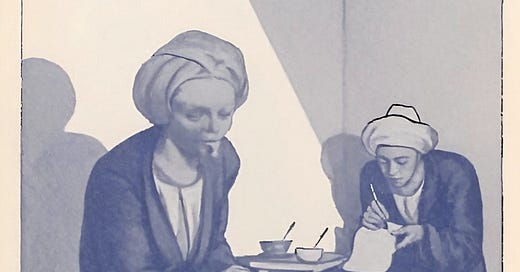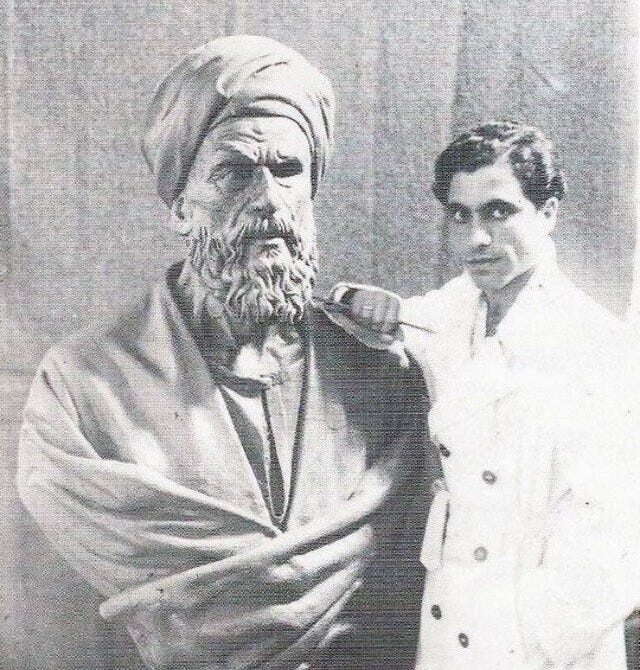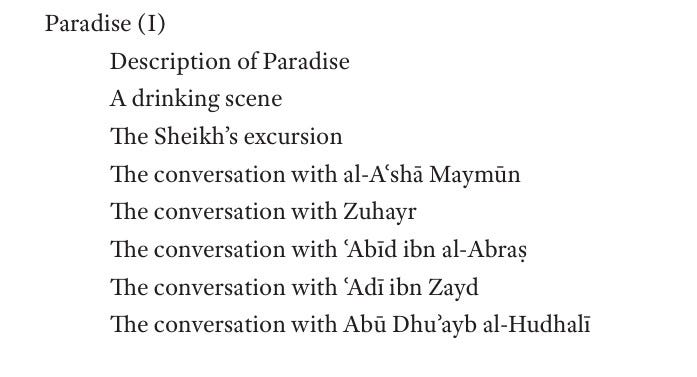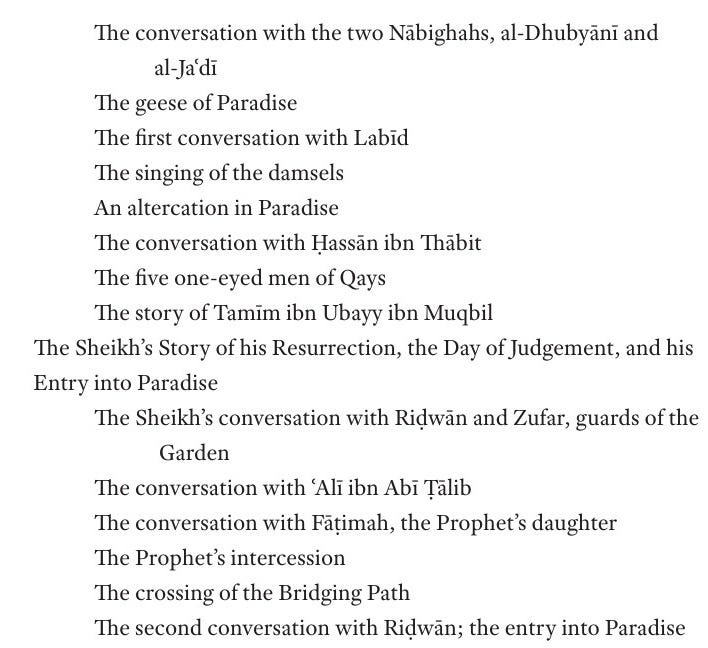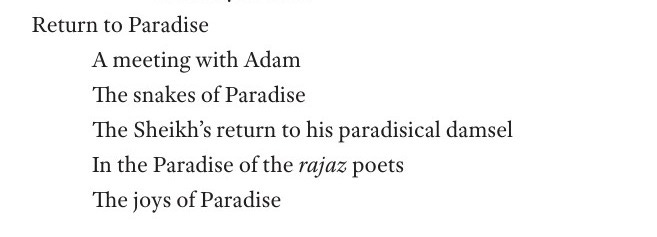⭐ Welcome Post: The Journey of DepthBeyondBelief. Abu al-Ala al-Ma'arri & The Epistles of Forgiveness (Risālat al-Ghufrān)
Going through an Arabic Masterpiece of Verse, Learning the Language along the way.
🔘 6 Months. In no more than 6 months, If you follow Depth Beyond Belief, we’ll have gone through a Classical Arabic Text together that has no similitudes in all of Islamic Literature.
🟡 Together, We’ll learn Arabic Tradition, Culture, Grammar, Rules of Poetry as well as meet famous people of both Paradise & Hell, hearing of what they made of their lives & what that may mean for us who are living.
Here’s who, what & why of the selection that I’ll be going through in this Stack.
(PDF Link of both versions of translation attached below).
“ 2 people in the History of Arabian Language, in who’s stomachs Arabic Language took root, developed and fully sprouted. One was ‘Abul Alaa’ al Ma’ari’ & the other ‘Ibn Sidah Mursi Andalusi’. ” ~ Allama Abdul Aziz Memoni1.
[Ironically both Ma’ari & Ibn Sidah2 were blind. As if blindness allowed for a sensuous feel to the highly abstract Arabic language, ultimately being benevolent on both the authors.]
Abu al-Ala al-Ma'arri (In Latin: Abulola Moarrensis) was nothing less than a unique character in his time. In that he is remembered in the West as amongst the ‘Fore-most Creative Geniuses of Islam’. Skeptic, surprisingly Anti-natalist in his views (against having children), a Moral Vegan, Ma’ari was also an outspoken critic of the orthodoxy.
Upon his 1000’th Death Anniversary, Al-Qaeda was kind enough to destroy a statue of his during the Syrian Civil War. What’s shocking is not that Al-Qaeda had come to destroyed the statue, but that the stature the man held in Arabic society despite his view to be venerated so graciously in the first place.3 Indeed, he has always been heralded as amongst the greatest of classical Islamic Poets.
Everyone’s heard of Dante Alighieri for sure. Alighieri is known to have been inspired by Muslim sources, but it can’t be proved whether he had studied Ma’ari or not.
Ascension to Heaven & Hell, & conversations with greatest of deceased people therein, The book “Risalat Al Ghufraan” predates Dante on the subject about more than a couple hundred years.
‘Epistles of Forgiveness’ by both G. Brackenbury (first English translation of the work from Arabic) in 1943. Gelder & Schoellers version, frankly with a much more appealing title ‘A Pardon to Enter the Garden’ came out fully in 2014.
Our Journey:
In 6 Months, together, we will be going through the book couplet by couplet. We’ll enjoy each verse alongside the minimal story of travel. & we’ll absorb and intake the beautiful verses in which Ibn Qarih [Main Character] meets poets in The Hereafter as well as other notable figures.
He has conversations with many of them, asking them of their life, deeds and what they think brought them to either Paradise or Hell. It starts gloriously with the name of God & Ends at it.
Here is a list of contents i.e the people we will encounter on our horizontal navigation of The Vertical.
On Explaining the Verses:
I am against explaining any couplet personally in that whilst doing so we take from the beauty of the whole and indulge in specifically relevant parts. It has been the case for me that I don’t like expounding on couplets and enjoy them in totality, absorbing their beauty as a whole.
Although I’ll be commenting on themes, parallelisms and more of the various couplets we encounter, I won’t be going through the meanings and explanations unless any verse warrants specially.
Root Word Nuance/Caveat:
Beyond a remarkable book of Poetry itself ,a reason for the whole Arabic Root Word Analysis that I include so laboriously is two-fold;
Al Ma’ari, when making use of Jahili Poets’ poetry, often uses terms pragmatically in the sense they were used before the coming of Islam. This is most fascinating to trace
Root word use can be traced throughout time to understand the evolution of Arabic as a language through time. Though I’m aware of the etymological fallacy to get to know the true roots of language, still it is amongst the reliable means of getting to understand a language (Walid Saleh, 2010)4 in the context of its evolution.
On The Previous Entries & The Forthcoming:
I released 3 entries on Labid which no one had a clue about as to the context. This post is being written to clear the reader and not as to puzzle him about what’s going on.
We’ll be beginning from the start. The Sihr of the book was such that I immediately started writing on where I was and started expounding on Labid. The verses albeit lovely, must have confused the reader on which I ask for a pardon.
We will go through from the beginning, with Paradise & Its descriptions. I will be alluding in references where needed to Islamic Tradition. & I look forward to the journey of Unpacking this book together.
You can support me if you’d like. It’d be encouragement. I run this in my spare time as an undergrad student and, Where I’m from, there’s no stripe yet. If you’d like to donate, I can be reached at here;
Happy Readings :D.
Drive Link:
you can read & explore the book faster than my updates and explorations on the stack preemptively. You can even critique me on it. Here’s a drive link in which PDFs can be found which you may read on your own.
https://drive.google.com/drive/folders/13zcFD3slcg5cDba2cR93mMmLkCs_vSeb?usp=sharing
The folder includes two files, which are both the 1943 translation & the newer version. The Brackenburry version is English Only, with Arabic only for the couplets.
The other version contains both the Arabic & English split in a page by page translation. Feel free to speedy read ahead :D
Footnotes:
(Great Arabic Scholar of Indo-Pak
in his Radio Interview to PTV).
Here’s his full interview to listen to.
Sadly Allama Memon has gone largely unnoticed
as a reverent figure in Indo-Pak.
He wrote a book on couplets of Al-Maari and more
titled “Abul A’laa Wa Ma Ilayh”, and it is through
this attached interview, I was introduced to the poet.
Ibn Sidah’s Lughah. In our previous entries on Labid, we’ve been consulting his dictionary “Al Muhkam” for our root world analyses
Shaykh Hamza Yusuf comments on the whole ordeal
can be found here.
Saleh, W. The Etymological Fallacy and Quranic Studies: Muhammad, Paradise and Late Antiquity.


